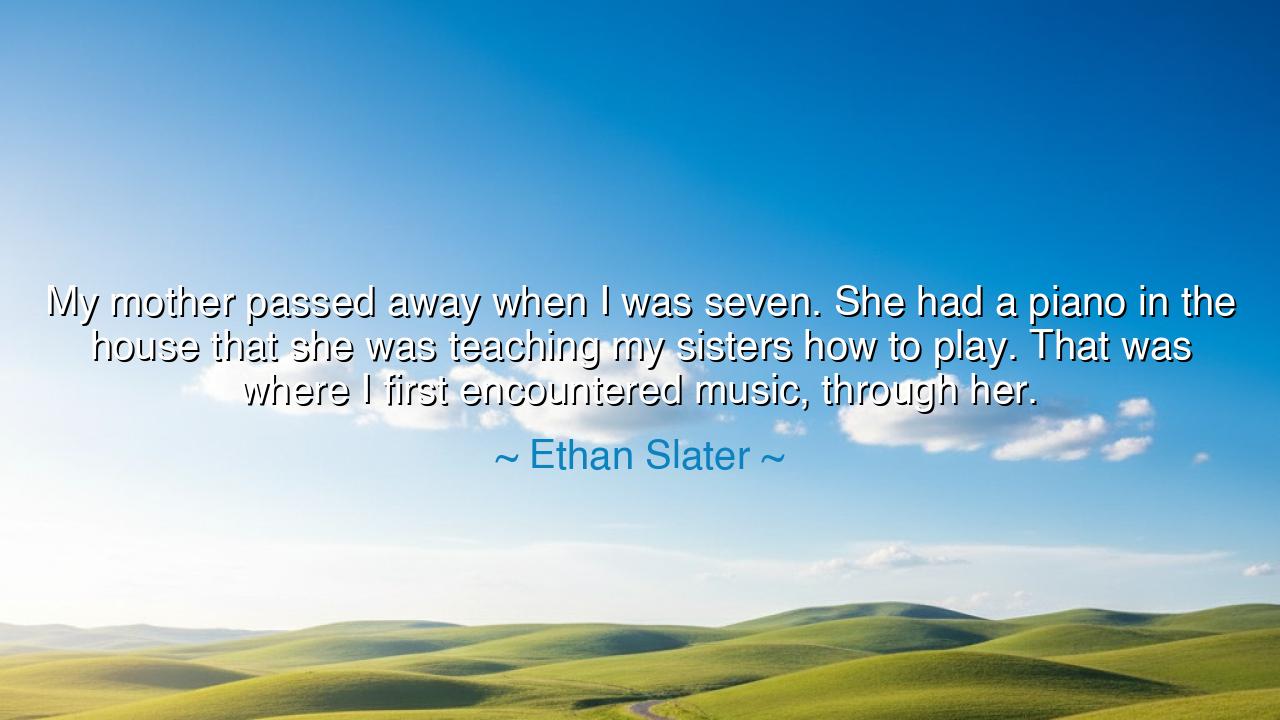
My mother passed away when I was seven. She had a piano in the
My mother passed away when I was seven. She had a piano in the house that she was teaching my sisters how to play. That was where I first encountered music, through her.






Hear the tender words of Ethan Slater, who said: “My mother passed away when I was seven. She had a piano in the house that she was teaching my sisters how to play. That was where I first encountered music, through her.” These words are not merely memory, but sacred testimony. They reveal how music, that eternal companion of humankind, is often born not from the grandeur of stages or the applause of crowds, but from the quiet rooms of childhood, from the presence of love, and from the echoes of those we have lost.
The ancients too knew this truth—that mothers are often the first teachers of song. In distant times, lullabies were the earliest form of music, cradling the infant not only in warmth but in rhythm, shaping the heart before the mind could understand words. In Slater’s memory, the piano becomes more than wood and strings—it becomes a shrine, a vessel of his mother’s spirit, the first doorway into a world that would later define his life. It is a reminder that what we encounter in childhood often becomes the seed of destiny, watered by love and grief alike.
Consider the story of Beethoven, who as a child was guided by his father to the keyboard. Though his father was harsh, though his childhood was not tender, it was still in those early encounters with the piano that greatness was planted. For Slater, the piano was not harsh but holy, the touch of his mother’s hand lingering in the keys. Thus, though her life ended too soon, her gift lived on, shaping her son’s path. Here lies the paradox of loss: though it wounds, it can also inspire; though it silences a voice, it can awaken music that resounds for generations.
Slater’s words also speak of the power of legacy. His mother may have departed when he was young, yet her presence endured through the instrument she left behind. In every note, he found her again. In every chord, her teaching lived. This is how the dead remain with us: not only in memory, but in the gifts they plant in our lives, which continue to grow long after their hands are gone. His first encounter with music was not through chance, but through her, and in this way, her love became eternal.
The lesson here is profound: we must never underestimate the power of the gifts we leave behind for others. A simple instrument, a song, a habit of kindness—these may outlast us, becoming the very thing that guides those we love. Just as Slater’s mother’s piano shaped his life, so too may our small actions shape the futures of others in ways we may never see. To live wisely is to sow such seeds, knowing that even if we are gone, the harvest will remain.
To you who listen, take comfort: though loss will come, and though grief may strike early or late, the gifts of those we love do not vanish. They live in us, in the lessons taught, in the songs sung, in the paths they opened for us. If you carry sorrow, turn it into creation. If you carry memory, turn it into strength. For in doing so, you honor the ones who gave you those first gifts.
Practical wisdom follows: cherish the instruments, the books, the traditions, and the simple teachings left by your elders. Do not let them gather dust, for they are sacred inheritances. Use them, as Slater used the piano, to encounter life more deeply. And if you are able, pass them onward, so that what began in one generation may blossom in the next.
Thus, remember Ethan Slater’s words: “That was where I first encountered music, through her.” Music, like love, is often first given to us by those who came before. And even when they are gone, the gift remains. Cherish it, nurture it, and let it guide your steps, so that your own life may one day become the melody through which others encounter beauty for the first time.






AAdministratorAdministrator
Welcome, honored guests. Please leave a comment, we will respond soon